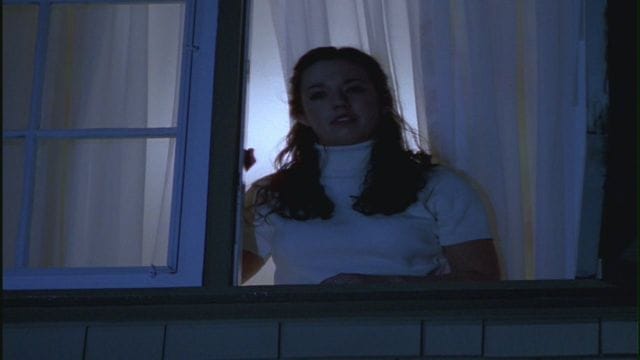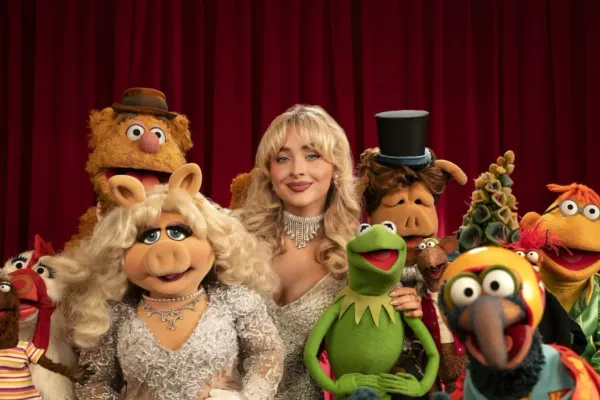Episodes: Missing Chrissy (spoilers for The X-Files)

"For although we may not be alone in the universe, in our own separate ways on this planet, we are all... alone." — Jose Chung
At the center of "Jose Chung's From Outer Space," the episode of television I have seen more than any other, are two teenagers, who went on a date that ended poorly and may or may not have been abducted by aliens in the process. Even for The X-Files, it is an elaborate clockwork machine of an episode, a dizzying dive into self-referential storytelling, layered plotting, and the unreliability of truth. I return to the episode once or twice per year, and I always come away from it with something new.
This time around, I realized the episode almost completely misses where its sympathies should lie.
The girl pictured above is Chrissy, who went on a date with Harold. She tells everyone she and Harold were abducted by aliens. But when Scully examines her, she tells the others that what happened to Chrissy was probably date rape. The sickest joke of the episode is that everyone has an easier time believing Chrissy was abducted by aliens than that Harold, a seemingly nice boy, raped her at the end of their evening together.
The relationship between Chrissy and Harold rests uneasily within "Jose Chung's." After all, this is a show about Mulder and Scully finding monsters and figuring out just what's going bump in the night. Even though the evil they confront seems truly existential, there's a comfort to their banter, to the way that they come face to face with these horrors and don't blink. But "Jose Chung's" posits that Mulder, especially, is a bottomless well of instability — a "ticking time bomb of insanity." Scully, meanwhile, in the world of the episode, is a good person but mostly ineffective when it comes to reining in her partner's over-the-top fantasies.
But the story is ultimately Chrissy and Harold's. They're the kids who either — depending on which version you believe — found themselves wrapped up in an intergalactic conspiracy or at the center of a date-rape case nobody takes seriously. And the episode's sympathies mostly lie with Harold! In the end, Chrissy resolves to put the whole thing behind her and make the world a better place. Harold, however, stands outside her window and tries to get her to speak to him, because he's in love with her. It's the very last shot of the episode, with Mark Snow's beautiful score, and Charles Nelson Reilly's magnificent voiceover (quoted above), and the actor's gut punch of a facial expression as Chrissy turns Harold down yet again.
And yet this is really weird, no? The best case scenario here is that Harold doesn't have a great deal of sympathy for a woman who was sexually experimented upon by aliens. The more likely one is that he raped her, nobody cared, and now, even the episode's sympathies lie with him.
Darin Morgan's script for the episode is one of the best ever written for television, dense and literate and filled with brilliant jokes and moments. But he can never quite find his way inside Chrissy's head, can never quite understand who she is beyond a symbol of the human cost that gets left behind in Mulder and Scully's relentless pursuit of the truth. And it's not as if he can't write women, either. Morgan's version of Scully is one of the show's very best.
The X-Files was often a show where the horror stemmed from the sexual abuse of women. In many episodes, that made sense. But what was weird was how many of the show's comedy episodes stemmed from rape. "Jose Chung's," of course, but also "Small Potatoes" (where a shapeshifter imitates women's husbands to impregnate them) and "The Post-Modern Prometheus" (where a mad scientist impregnates the women of a small town against their will). I love all of these episodes, but only "Prometheus" — with its complicated, looping fantasy structure — actually attempts to deal with the real-life consequences of these horrors visited upon these women. The X-Files was written by a boys' club, and it never shows more than it does in these instances.
And yet on some level, Morgan seems aware. "Jose Chung's" is about living with trauma, about the way that the pieces of your life can fly apart and never quite come back together in the same way. Chrissy was either abducted by aliens, or she came up with that story as a way to convince herself she wasn't stupid enough to trust a boy like Harold. She is the center of this tale because she is the person in an episode full of elusive answers who best realizes that sometimes, you can't understand the horrors that happen to you. You can only live through them.
Morgan closes the episode on that rumination on loneliness and love, the connection we all seek and the fact that when it comes down to it, we are sealed off from each other, doomed to experience our own lives and only our own lives. And though it's Harold who receives the sympathy, it's Chrissy who actually sees a way forward through her charitable work.
Being alone is a life sentence, but so is trying to do good, if you make it one. Harold — rapist or no — doesn't deserve sympathy so much as utter pity, because he can't understand that he's living in a before, where everybody else has moved on to the after.
--
Episodes is published daily, Monday through Friday, unless I don't feel like it. It is mostly about television, except when it's not. Read more of my work at Vox Dot Com.




